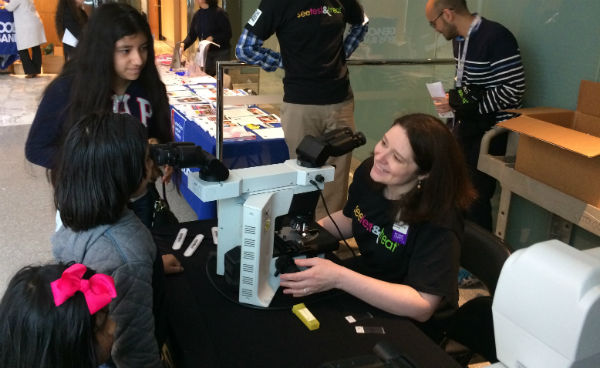
Child looks through double-headed microscope at the 2017 See, Test & Treat event
Pathologists have traditionally played a “behind-the-scenes” role in medical diagnosis and patient care. No longer. As 21st-century medicine continues along its trajectory of rapid change, we pathologists are becoming more-visible members of the healthcare team. We’re also coming out from behind the microscope, so to speak, and reaching out to the communities we serve.
The College of American Pathologists (CAP) has been instrumental in facilitating this change. One exciting vehicle developed by CAP is See, Test & Treat (STT), an innovative community outreach program. Hosted annually by pathology departments in healthcare facilities across the country, STT offers free cervical and breast cancer screenings for women ages 21 to 64 who are uninsured or underinsured. Patients receive same-day results and a plan for follow-up care.
Six years ago, when the chair of my department, Dr. Michael Prystowsky, suggested that we introduce STT here at Montefiore Einstein, I was happy to help implement the program, with the assistance of Jonathan Sussman in the pathology department.
Here’s how STT works. The pathology department collaborates with the Montefiore Einstein departments of radiology and of obstetrics & gynecology and women’s health. All team members—from senior-level clinicians to laboratory technicians—volunteer their time on a Saturday in conjunction with a host of community organizations. In my years of involvement with the program, I’ve seen that STT is more than a free public health service; it’s a support system for patients.
Downstairs, in the exam rooms, patients receive their screenings and consult with physicians. Upstairs, the lobby of the Greene Medical Arts Pavilion at Montefiore is abuzz as women, many with children in tow, stop by the colorful display tables to chat with volunteers and collect health-education brochures, tote bags and other giveaways. Participating groups include the Montefiore Einstein BOLD program, LatinaSHARE, Healthfirst and the American Cancer Society.

Our STT features a unique patient-education activity. Pathology residents invite individual program participants to peer alongside them, through double-headed microscopes, at actual specimens of abnormal Pap smears: human papilloma virus (HPV), changes in low-grade squamous intraepithelial lesions, and precancerous high-grade squamous intraepithelial lesions. Residents engage participants in a discussion of the importance of the Pap as a screening test to detect precancerous changes, and demonstrate the pathologist’s role in detecting these changes.
Not only does this exercise showcase the pathologist’s ability to identify precancerous lesions of the cervix; it helps patients understand the purpose and value of the tests they’re asked to undergo. What’s more, peering through the microscope together becomes a doctor-patient bonding experience. Engaging in this way humanizes each party while, in some cases, piquing participants’ interest in medical science. It’s especially gratifying to witness the awestruck expressions on the faces of participants’ young children, who take their own turns at the microscope. With luck, maybe years from now, some of these girls and boys will look back on the experience as the moment that inspired them to pursue a career in pathology or in some other STEM-related field.
Using pathology residents as health educators thrusts our trainees into the role of medical science and patient-care “role models.” The residents learn to model these processes as examples of community outreach by pathologists in disease detection and prevention, and can adapt them in their future practices.
I recall one of our residents saying how rewarding it was to show people the “Paps on the microscope.” The participants asked many questions, and the resident was surprised by how interested they were. Seeing and learning about live laboratory specimens firsthand made the Pap “real” for them: a tangible object as opposed to an abstract concept.
This year, thanks to a generous grant from CAP, we’re expanding our STT program beyond the current core services. We’ll distribute culturally sensitive health-education pamphlets we’ve created to explain HPV vaccination and its vital importance to the health of preteens and teenagers. Written in user-friendly English and Spanish and featuring colorful illustrations created by young people from the Bronx community, the pamphlets will be free of charge. STT attendees will be encouraged to take them home to share with family and friends.
When it comes to healthcare, women are often the primary decision-makers for their families and a trusted source of information in their communities. With that in mind, we’re hoping a secondary benefit of the pamphlet distribution will be “word of mouth” referrals by this year’s program participants to future STT attendees. We’re planning to track cell phone and computer ownership and use as well as participation in social media among our participant population, with an eye toward using these platforms as a means to distribute an “electronic pamphlet” about STT. We plan to measure outcomes and milestones via a patient questionnaire asking new STT patients how they learned of the program, and returning patients about the vaccine status of their children.
Another first this year: We’ve reached out to Einstein student volunteers who staff the student-coordinated ECHO Free Clinic and asked them to participate. We’re hoping they’ll join the See, Test & Treat team, and that they’ll encourage their patients to participate in this valuable public health program.
This year’s See, Test & Treat will take place on Saturday, May 19, from 9 a.m. to 2 p.m., in the Greene Medical Arts Pavilion on the Moses campus. All interested Einstein students and faculty are encouraged to participate. For more information, contact: Jonathan Sussman, Project Manager, at jsussman@montefiore.org or 718.920.5235.

